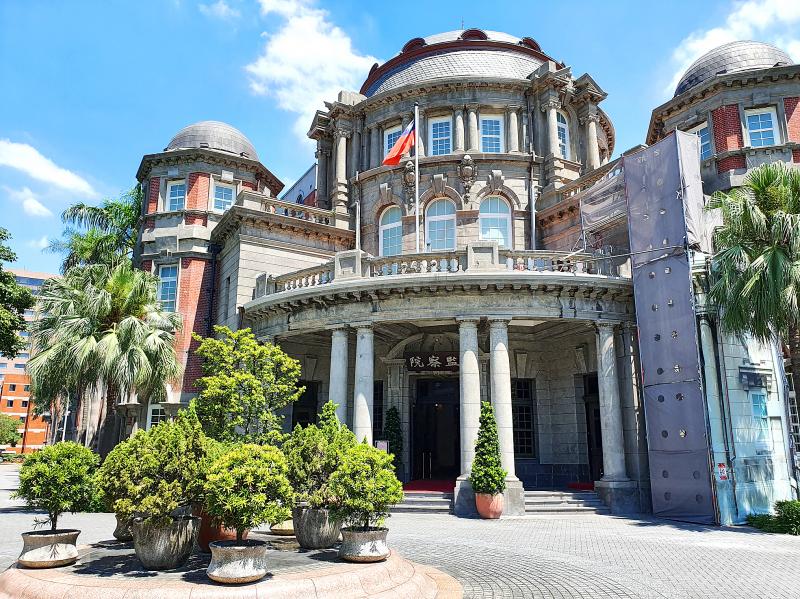Former Taitung County commissioner Justin Huang (黃健庭) of the Chinese Nationalist Party (KMT) yesterday declined a nomination from President Tsai Ing-wen (蔡英文) to serve as Control Yuan vice president.
The announcement came one day after news of the planned appointment sparked criticism across the political spectrum.
Huang said in a video on Facebook that he cared about his reputation “far more than any position” and urged people who were “using [him] as a shield to shift the focus” to stop what they were doing.

Photo: Hsieh Chun-lin, Taipei Times
The KMT said in a statement that it welcomed Huang’s announcement.
The party said that comments by Democratic Progressive Party (DPP) members over the past two days showed that Tsai only wanted to use Huang to help turn the focus away from former Presidential Office secretary-general Chen Chu (陳菊), instead of “borrowing” talent from the KMT.
Chen, who is expected to be nominated as Control Yuan president, has been involved in three impeachments and more than 50 cases of corrective measures by the Control Yuan, the KMT said.
If Tsai, who doubles as DPP chairperson, believes Huang is suitable for the position, she should defend the nomination, instead of allowing members of her party to attack Huang, the KMT said.
If the DPP needs to “borrow” KMT members to serve in the government, it should discuss the matter with the party, instead of directly approaching its members, it said.
As Huang has withdrawn from the nomination, the KMT would not take disciplinary action against him, the party added.
Presidential Office spokesman Xavier Chang (張惇涵) said Tsai respected Huang’s decision, adding that the KMT’s talk of a “party-to-party” approach to determine a nominee was not in line with the Constitution.
Tsai’s planned nomination of Huang also drew criticism from the DPP.
The Presidential Office did not communicate with DPP members about Huang’s planned nomination, said a party member, who spoke on condition of anonymity.
DPP Legislator Mark Ho (何志偉) said that the nominee for Control Yuan vice president should be first discussed with DPP lawmakers.
A legislative provisional session that was expected to be held after the Dragon Boat Festival holiday could be affected following the Presidential Office’s cancelation on Friday of a news conference at which the nominations for Control Yuan members were to be announced, sources said.
The DPP legislative caucus had planned on calling an extraordinary session as early as June 29 to review a number of topics, including the Control Yuan nominations, the sources said.
DPP caucus secretary-general Chung Chia-pin (鍾佳濱) said that if lawmakers are informed about the nominations before the holiday, an extraordinary session could be held following the holiday.
A session could still be held even if the nominations are announced after the holiday, but they would not be included in the agenda, he said, adding that lawmakers would handle other cases first.
A third option is to wait until the nominations are announced to hold the session, he added.
Additional reporting by CNA

CHAOS: Iranians took to the streets playing celebratory music after reports of Khamenei’s death on Saturday, while mourners also gathered in Tehran yesterday Iranian Supreme Leader Ayatollah Ali Khamenei was killed in a major attack on Iran launched by Israel and the US, throwing the future of the Islamic republic into doubt and raising the risk of regional instability. Iranian state television and the state-run IRNA news agency announced the 86-year-old’s death early yesterday. US President Donald Trump said it gave Iranians their “greatest chance” to “take back” their country. The announcements came after a joint US and Israeli aerial bombardment that targeted Iranian military and governmental sites. Trump said the “heavy and pinpoint bombing” would continue through the week or as long

TRUST: The KMT said it respected the US’ timing and considerations, and hoped it would continue to honor its commitments to helping Taiwan bolster its defenses and deterrence US President Donald Trump is delaying a multibillion-dollar arms sale to Taiwan to ensure his visit to Beijing is successful, a New York Times report said. The weapons sales package has stalled in the US Department of State, the report said, citing US officials it did not identify. The White House has told agencies not to push forward ahead of Trump’s meeting with Chinese President Xi Jinping (習近平), it said. The two last month held a phone call to discuss trade and geopolitical flashpoints ahead of the summit. Xi raised the Taiwan issue and urged the US to handle arms sales to

BIG SPENDERS: Foreign investors bought the most Taiwan equities since 2005, signaling confidence that an AI boom would continue to benefit chipmakers Taiwan Semiconductor Manufacturing Co’s (TSMC, 台積電) market capitalization swelled to US$2 trillion for the first time following a 4.25 percent rally in its American depositary receipts (ADR) overnight, putting the world’s biggest contract chipmaker sixth on the list of the world’s biggest companies by market capitalization, just behind Amazon.com Inc. The site CompaniesMarketcap.com ranked TSMC ahead of Saudi Aramco and Meta Platforms Inc. The Taiwanese company’s ADRs on Tuesday surged to US$385.75 on the New York Stock Exchange, as strong demand for artificial intelligence (AI) applications led to chip supply constraints and boost revenue growth to record-breaking levels. Each TSMC ADR represents

Pro-democracy media tycoon Jimmy Lai’s (黎智英) fraud conviction and prison sentence were yesterday overturned by a Hong Kong court, in a surprise legal decision that comes soon after Lai was jailed for 20 years on a separate national security charge. Judges Jeremy Poon (潘兆初), Anthea Pang (彭寶琴) and Derek Pang (彭偉昌) said in the judgement that they allowed the appeal from Lai, and another defendant in the case, to proceed, as a lower court judge had “erred.” “The Court of Appeal gave them leave to appeal against their conviction, allowed their appeals, quashed the convictions and set aside the sentences,” the judges